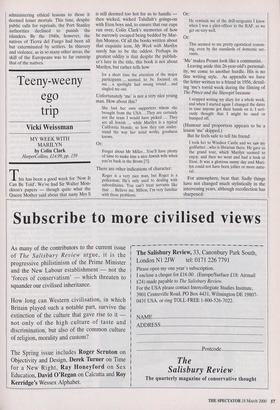Mission not successful
Nicholas Fearn
SAVAGE by Nick Hazlewood Hodder, £12.99, pp. 359 Cultural relativism never quite recovered from the blow unwittingly administered by the pop-star Sting. Some years ago, the passionate environmentalist purchased a large tract of Amazonian rain- forest for the sum of several million pounds. He then donated the land to the local Indian tribe so that their way of life would remain forever safe from the depre- dations of the West. The tribe promptly sold the title deeds to a logging company and legend has it that the proceeds keep A Fuegian as seen by the crew of the Beagle them happily in burgers and Coca-cola to this day. Nick Hazlewood's account of the life and times of Jemmy Button provides a counterpoint to this story. Perhaps the temptations of the West have come a long way since the days of Captain Robert Fitzroy, who had only dried pork and ship's biscuits to offer the natives of Tierra del Fuego in lieu of Big Macs. Alternatively, Savage might show that integrity and senti- mentality are not evenly distributed among primitive cultures.
In 1830, Captain Fitzroy of the Beagle was charting the coastlines of 'the Land of Fire' at the tip of South America when he decided to bring several natives back with him to England. The islanders would be shown the finest a Christian civilisation had to offer in the hope they would then propa- gate its values among their own people. There could have been few places where such a project was less feasible. That other famous passenger on the Beagle, Charles Darwin, himself judged that man existed there 'in a lower state of improvement than in any other part of the world'. Though not lacking in intelligence, the islanders had no notion of God, clothing or private proper- ty. Despite these handicaps, the three natives who survived the journey proved a modest success in England. The favourite among them was Jemmy Button, a young man so named because his family had trad- ed him (presumably involuntarily) for a large button. Button eagerly took to civili- sation, developing a dandyish sense of dress and never appeared on deck without shined shoes and a pair of fine gloves. The islanders arrived home at the end of 1832, and Fitzroy returned 13 months later to check on their progress. The young Fue- gian was found naked and emaciated with no sign of his companions or the supplies with which they had been furnished.
, The story is resumed with the arrival of a publicity-seeking missionary named George Packenham Despard, who took Button to Keppel Island in the Falklands. Like many of Despard's own countrymen, Button did not take readily to the representative of the Patagonian Missionary Society. Enticing the Fuegians into heaven with trinkets proved difficult, as the Fuegians were not always pleased with what they were given. Tempted with suits from the South Ameri- can mainland, Button and his family were not so unused to clothing that they could not tell inferior quality goods when they saw them. Button's favourite English phrase, repeated in many journal entries, seems to have been the sarcastic 'What do you call this?' which he would carefully pronounce while tugging at his new attire. The Fuegians also seem to have swiftly developed the bolshy notion of a fair day's pay for a fair day's work — which to them clearly meant more than the biscuits they were given for digging gardens and weaving baskets. They proceeded to add to their light-fingered reputation, but Despard would tolerate no thievery in his mission and each time he ordered a surprise search the Fuegians would loudly protest their innocence. Once they threw their bundles into the sea in indignation, exposing in the process their haul of silk handkerchiefs. After one incident, Despard charged his catechist, Garland Phillips, with continuing his work in the natives' home island of Wulaia. 'Try them with much singing,' he advised. It was during a hymn in the mis- sion house there in November 1859 that Phillips and eight colleagues were stoned to death by irate Fuegians.
The British empire of the day, as the author points out, was rarely slow in administering ethical lessons to those it deemed lesser mortals. This time, despite public calls for reprisals, the Port Stanley authorities declined to punish the islanders. By the 1940s, however, the natives of Tierra del Fuego had been all but exterminated by settlers. In thievery and violence, as in so many other areas, the skill of the Europeans was to far outstrip that of the natives.



















































































 Previous page
Previous page